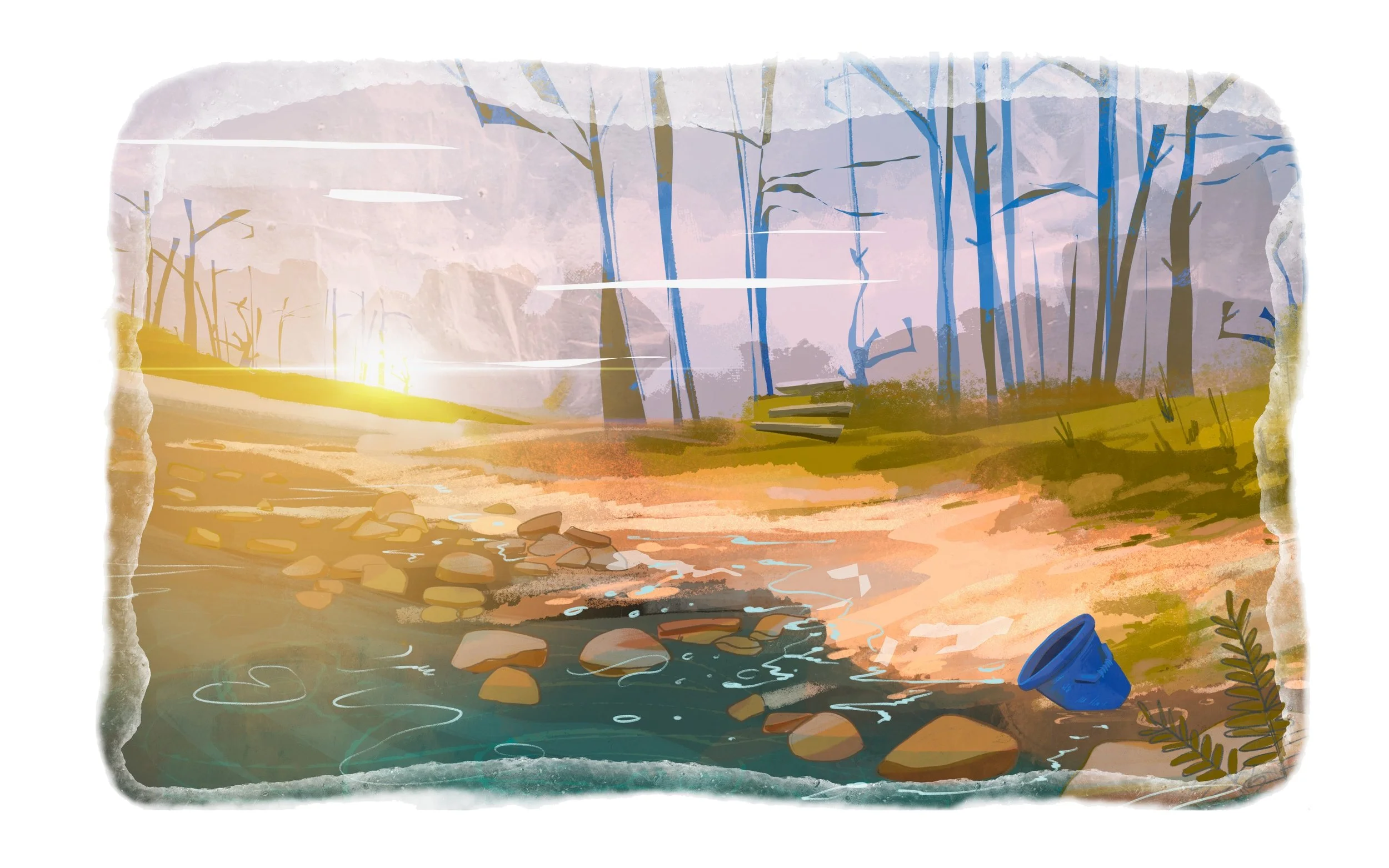ESSAY
The Forest's Gifts
Fiction By Laima Vincė
Illustration by Nikita Akula
When I walk the beach, I usually bring a bag with me to collect the trash tossed from the sea onto the shore. I end up with a bagful of plastic that could otherwise find its way into the bellies of fish, birds, seals, whales, or other creatures.
Today, though, I've forgotten to bring my trash bag. I’m disappointed with myself because last night the wind picked up and the sea tossed out a large quantity of refuse. So now, I walk along the beach and pick up all that I can carry. But there is too much to hold, and I regret that I’ll have to leave so much behind.
In the distance, I spot a large blue bucket washed up on the sand. The sea has sent me the perfect container to collect the plastic bags, bottles, ropes, and other pieces of waterlogged trash.
I pick up the blue bucket and quickly fill it. I am grateful to the sea for its gift, and the sea is grateful in return for my small chore.
After I’ve breathed my fill of the sea air, after I’ve thoroughly enjoyed the view, ripples of pale blue-gray water stretching out to the horizon, I return to the steep wooden stairs that lead over the dunes and down into the forest where a sandy path leads to my home. As I climb the stairs, I am content that for at least one day, the coastline is a little cleaner. I toss the bucket and its contents into the dumpster at the base of the stairs and hope that it doesn’t all end up back in the Baltic Sea.
As I walk through the forest, I listen to how the wind whips through the tops of the pine trees. I stop and toss back my head, admiring how rhythmically the green crowns sway back and forth. Two young boys run past me, racing down the hill towards the stairs that lead up and then down to the sea. They are joyous as only children can be joyous. They call out to one another in shrill voices and laugh out loud. Then the older boy calls out to the younger one, who has raced too far ahead: Vilius, Vilius.
I am suddenly back in my childhood. Back in my own Palisades Forest thousands of miles away across the Atlantic. My brothers and my sister and I are racing through the woods, and now I am calling out my brother’s name—Vilius, Vilius.
Vilius is an unusual name, even in Lithuanian. This is the first time in all these years since my brother committed suicide that I have heard his name spoken aloud outside of our family circle.
A wave of happiness washes over me. My brother Vilius has been dead for thirty years. He died suddenly, unexpectedly, tragically. He died when he was only 29, a young man. I am now old enough to be his mother, as he was then, frozen in time. He is now younger than even the eldest of my sons, who was a baby when Vilius held him in his arms for the last time. And now, here in the forest, as though for a fleeting moment, Vilius is alive again, racing down a hill, and he is happy. He is mischievous, as he was back then.
I climb the hill towards my favorite bench and sit. From here, I scan the blue sea over the tops of the pines and firs. I pull out my journal from my backpack and I write these words. It feels good. I feel warmth in my heart again. I feel as though all is reconciled between my brother and me. All around me there is the fragrant forest. Birds are singing. I am surrounded by trees hundreds of years old. I feel safe between their tall slender trunks, as though I were surrounded by a crowd of tall, watchful mothers. Under my feet, the bright green moss of early spring, the forest’s carpet, soothes my soles.
At this moment, I am happy as I have not been for thirty years. It’s as though Vilius is alive again, and sitting beside me on this bench, and we are talking, as we always did, about things both profound and ridiculous. After such a long time of missing my brother, my heart is calmed.
Why am I so fortunate as to be calm, happy, safe, just as hundreds of thousands of people in the world—right now, as I sit on this bench—are suffering?
My paltry lungs, ruined by pneumonia and by living long years in the smog of New York and Beijing, are breathing with the lungs of this immense forest as though it were an enormous ventilator inhaling and exhaling in unison with me.
I am fortunate in my misfortune.
I am Laima, named for the Baltic Goddess of Fortune.
And that is all. . .
Laima Vincė’s most recent books are Vanished Lands: Memory and Postmemory in North American Lithuanian Diaspora Literature (Peter Lang Publishers, 2023) and The Cerulean Bird: The Poetry of Matilda Olkinaitė (Arc Publications, 2023). She has been awarded two Fulbright grants in Creative Writing, a National Endowment for the Arts award in Literature, a PEN Translation Award, and many other honors. Laimavince.com.

